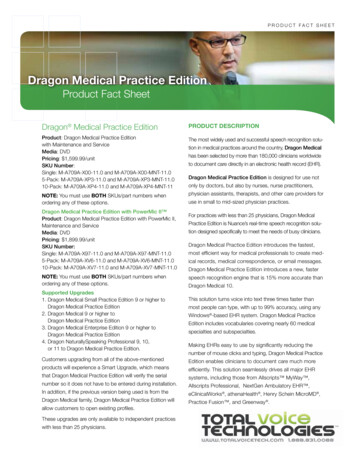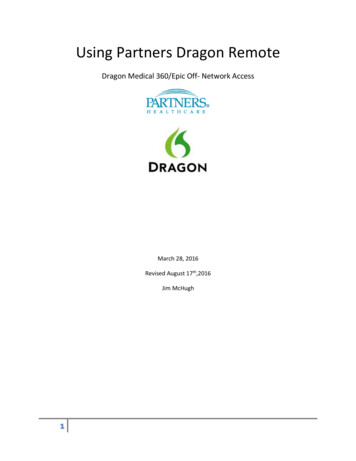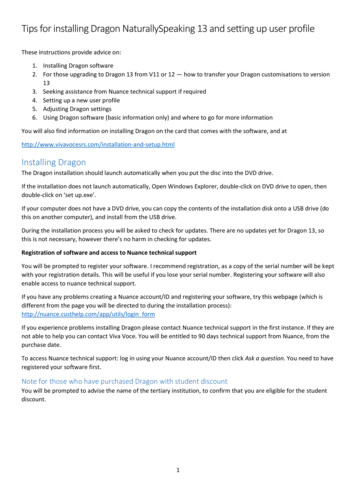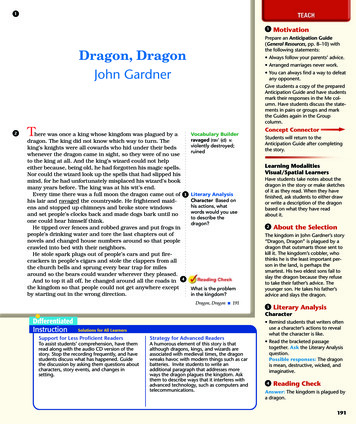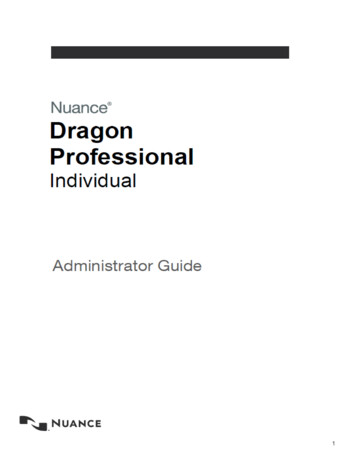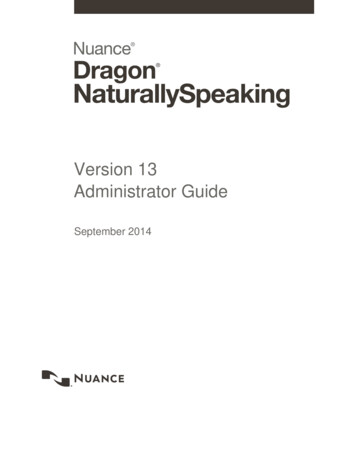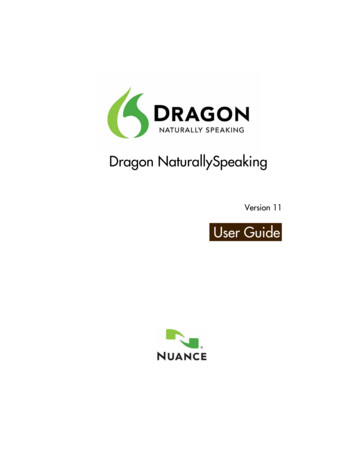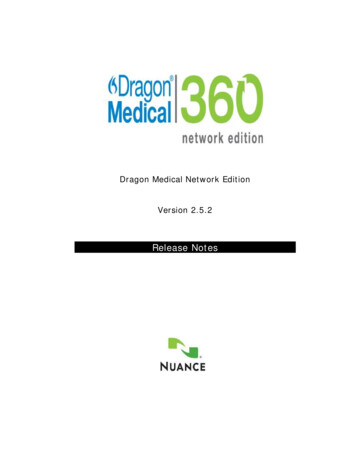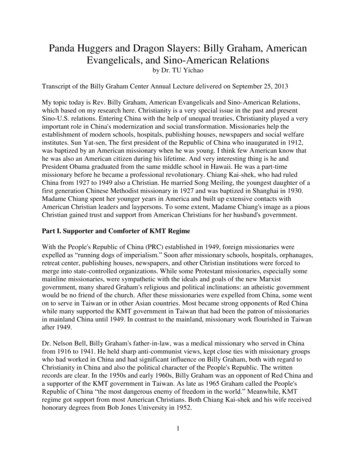
Transcription
Panda Huggers and Dragon Slayers: Billy Graham, AmericanEvangelicals, and Sino-American Relationsby Dr. TU YichaoTranscript of the Billy Graham Center Annual Lecture delivered on September 25, 2013My topic today is Rev. Billy Graham, American Evangelicals and Sino-American Relations,which based on my research here. Christianity is a very special issue in the past and presentSino-U.S. relations. Entering China with the help of unequal treaties, Christianity played a veryimportant role in China's modernization and social transformation. Missionaries help theestablishment of modern schools, hospitals, publishing houses, newspapers and social welfareinstitutes. Sun Yat-sen, The first president of the Republic of China who inaugurated in 1912,was baptized by an American missionary when he was young. I think few American know thathe was also an American citizen during his lifetime. And very interesting thing is he andPresident Obama graduated from the same middle school in Hawaii. He was a part-timemissionary before he became a professional revolutionary. Chiang Kai-shek, who had ruledChina from 1927 to 1949 also a Christian. He married Song Meiling, the youngest daughter of afirst generation Chinese Methodist missionary in 1927 and was baptized in Shanghai in 1930.Madame Chiang spent her younger years in America and built up extensive contacts withAmerican Christian leaders and laypersons. To some extent, Madame Chiang's image as a piousChristian gained trust and support from American Christians for her husband's government.Part I. Supporter and Comforter of KMT RegimeWith the People's Republic of China (PRC) established in 1949, foreign missionaries wereexpelled as “running dogs of imperialism.” Soon after missionary schools, hospitals, orphanages,retreat center, publishing houses, newspapers, and other Christian institutions were forced tomerge into state-controlled organizations. While some Protestant missionaries, especially somemainline missionaries, were sympathetic with the ideals and goals of the new Marxistgovernment, many shared Graham's religious and political inclinations: an atheistic governmentwould be no friend of the church. After these missionaries were expelled from China, some wenton to serve in Taiwan or in other Asian countries. Most became strong opponents of Red Chinawhile many supported the KMT government in Taiwan that had been the patron of missionariesin mainland China until 1949. In contrast to the mainland, missionary work flourished in Taiwanafter 1949.Dr. Nelson Bell, Billy Graham's father-in-law, was a medical missionary who served in Chinafrom 1916 to 1941. He held sharp anti-communist views, kept close ties with missionary groupswho had worked in China and had significant influence on Billy Graham, both with regard toChristianity in China and also the political character of the People's Republic. The writtenrecords are clear. In the 1950s and early 1960s, Billy Graham was an opponent of Red China anda supporter of the KMT government in Taiwan. As late as 1965 Graham called the People'sRepublic of China “the most dangerous enemy of freedom in the world.” Meanwhile, KMTregime got support from most American Christians. Both Chiang Kai-shek and his wife receivedhonorary degrees from Bob Jones University in 1952.1
Hollington Tong, Ambassador of Taiwan Regime to the United States from 1956-1958, also apious Presbyterian who kept close tie with Dr. Nelson Bell. Only in 1956, there were 17correspondence letters between them. (BGEA, Box 52, folder 17.) During his term in the US, heactively engaged in American Christian communities to facilitate the anti-China lobby with theChristian support.In the 1950s Graham and other American evangelicals hoped and prayed that the KMTgovernment might reassert control of the Mainland, once again opening China to missionarywork. Madam Chiang became the friend of Ruth and the following year Madame Chiang was amember of a prayer group in Taiwan, joining with thousands of similar prayer groups all over theworld in support of Graham's New York City crusade of 1957. At that time Billy Graham hadnot yet reached the peak of his fame, but the Chiangs were already loyal supporters.Billy Graham visited Taiwan four times and developed a personal friendship with Generalissimoand Madame Chiang.In Dec 29, 1952, as a rising young evangelist Billy Graham saw Chiang Kai-shek in Taipei andhe told an American correspondent that he was “very greatly impressed by Chiang Kai-shek'sspiritual quality” and thought U.S. “should give him and the people of free China every helppossible.”Billy Graham toured Southeast Asia after his crusade in India in 1956. He spoke to a largegathering of missionaries in Thailand and also went to Philippines, Hong Kong, Taiwan, Japanand South Korea to preach. On Feb. 16, Generalissimo and Madame Chiang received him at theirmansion.In 1971 American Secretary of State Henry Kissinger secretly visited China and not long afterthe People's Republic took over the China seat in the United Nations Security Council. Nixonadministration strategically shifted its policy toward People's Republic of China. Suddenlyfacing a profoundly uncertain future, KMT regime used secret diplomatic channels tocommunicate with the Nixon administration. Chiang Kai-shek was deeply frustrated by thesituation and invited Billy Graham to visit Taiwan. Chiang hoped to leverage Graham's uniquestatus in American politics, his close relationship with President Richard M. Nixon, and hisstrong ties with China to shore up Taiwan's credibility at this moment of crisis. Billy Grahamdiscussed the proposed visit to Taiwan with Dr. Kissinger, asking background information andcounsel from the Secretary of State. Kissinger provided Graham with highly sensitivebackground information and “key talking points.” He also asked Graham to carry the President'sgreetings and an affirmation of the US-Taiwan alliance. President Nixon connected with Mr.Graham several times and met him once in the White House to make sure the Evangelist wouldstrike just the right tone in his talks with the Generalissimo. Dr. Kissinger followed up with sometalking points for Graham's conversations with Taiwan Christian leaders, emphasizingWashington's security guarantee for the Taiwan government. The promise Graham carried toPresident Chiang and the people of Taiwan on behalf of the American President carried the fullweight of foreign policy along with the considerable force of American popular opinion. BillyGraham used his moral influence as a preacher and friend of presidents to reassure the Chiangsabout the US-Taiwan alliance, and to restore confidence among Taiwanese people in to2
America's commitment to Taiwan's future and security. The best-known American Evangelistbecame an envoy of affirmation and comfort to America's ally.President Nixon's visit to Beijing in 1972 was controversial in the U.S., also in the whole westerncampaign. The American President faced public hectoring and private resistance to his boldinitiative. At Nixon's suggestion, Billy Graham convened a meeting of more than twenty of themost influential conservative Christian leaders to hear Kissinger's defense of the administration'snew policy initiative toward China. It is not impossible this administration could open doors longclosed to the gospel.On April 16, 1975, Billy Graham gave the sermon at a memorial service for Chiang Kai-shek inWashington's National Cathedral. In October the same year, a five-day Billy Graham crusadewas held in Taipei with strong official support and Madame Chiang seated in the chair of honor.Madame Chiang even commanded the prime minister's office to alter the date of a national gamein order to place the largest open-air stadium unreservedly at the crusade's disposal. During hisstay in Taiwan Graham visited the tomb of Chiang Kai-shek and reaffirmed his continuingfriendship with the government and people of Taiwan.Part II. Hong Kong: Mission Base for Greater China and Southeast AsiaAs the key founder of the Lausanne Committee on World Evangelization (LCWE), Billy Grahamrecognized the significance of the missionary movement in various regions of the world andbegan encouraging the development of infrastructure to help indigenous churches evangelizemore effectively. The International Congress on World Evangelization in Lausanne, Switzerland(1974) and its follow-up meetings, including the Chinese Congress on World Evangelization inHong Kong in 1976, promoted the solidarity of Asian churches in various countries, each ofwhich worked to develop evangelistic strategies and implementation methodologies before andafter the Lausanne Movement conferences, “the whole church taking the whole gospel to thewhole world.” In 1977-78 a series of Lausanne follow-up meetings were held in Singapore withBilly Graham's full support. Chinese Christians were organized and trained in these meetings andHong Kong became a key center for the Chinese missionary movement.After China began to open in 1978, The Chinese Coordinating Center of World Evangelism(CCCOWE), a missionary organization headquartered in Hong Kong, investigated the religioussituation in mainland and made careful plans for the evangelization of Mainland China.CCCOWE is an integral part of the LCWE. Many Chinese Christians devoted themselves to theplanting of house churches, convinced that they are the normal and effective means to theevangelization of China. In the mid-1980s, there were more than 5,000 ethnic Chinese churchesas member churches of the Lausanne Committee. Rev. Thomas Wang, the leader of thecommittee, became the executive director of LCWE in 1986, working with Chinese Christians tobuild a strong missionary movement for evangelizing ethnic Chinese throughout the world.After the 1997 handover of Hong Kong to China, the territory has continued to enjoy relativereligious freedom. Evangelical organizations continue to be very active in Hong Kong.3
Part III. Billy Graham and the People's Republic of ChinaEven though Billy Graham's first visit to China had been strongly opposed by both the ChristianRights and the political conservatives, Graham gained support from many sides of the politicalarena. As with his previous success in communist Eastern Europe, the Evangelist was the rightperson to communicate with the Mainland and Taiwan. He also was well equipped to help fill“the ideological vacuum” in China during its transition years to a new market-oriented socialismwith Chinese characteristics.With President Nixon's help, Ruth Graham and her three brothers and sisters returned to China in1980. As the Bell Children and Billy Graham's wife or in-laws, they were semi-official guests ofthe government. It was unusual in China in the early 1980's. They have tea with Madame SoongChing-ling, the widow of Sun Yat-sen, the older sister of Madame Chiang and then the vicechairman of the standing committee of National People's Congress in their first afternoon inBeijing. Remarkably they were able to visit Qingjiangpu, their birthplace, where foreigners atthat time were forbidden to travel. During her visit Mrs. Graham began building relationshipswith Chinese government officials and with church leaders, some of whom were instrumental inopening the way for Graham himself to visit China.In 1985 Bishop K. H. Ting, head of the China Christian Council (CCC) sent a preliminaryinvitation to Billy Graham. After some negotiations, a firm invitation came from the ChinesePeople's Association for Friendship with Foreign Countries (CPAFFC) and the CCC. Mr. ZhangWenjin, former ambassador to the United States, was at that time the president of CPAFFC.Graham referred to Sidney Rittenberg repeatedly for his help. Rittenberg was a young idealistwho decided to stay in China after 1949. His personal experience and thought convinced him thatChristianity was useful for China. He assisted Billy Graham's visit in China by facilitating highlevel conversations between China and the American Evangelist's delegation. Rittenberg hadkept in touch with senior Chinese leaders and used these relationships to pave the way for BillyGraham's visit.After several months' delay because of his rib fracture, Billy Graham and his team visited Chinain a seventeen-day, five-city trip in April 1988. Premier Li Peng met with Graham for fiftyminutes in Zhongnanhai, the Communist Party's sealed enclave next to the Forbidden City inBeijing. It was the first time a foreign Christian leader was granted the honor of a reception as astate guest. Their meeting had an unexpected outcome as Billy Graham went public throughChinese mass media. In China no media is private enterprise and all media must speak for the“correct direction of public opinion.” So the evangelist's meeting with the top CPC officers onthe mass media facilitated his journey in China. He admitted that “By going public on television,on radio, and in the press about our private conversation, the premier created visibility andcredibility for us that we could never have gotten otherwise and opened many doors for us.”Billy Graham also visited other cities such as Shanghai, Guangzhou, Nanjing and Ruth'sbirthplace, Huaiyin in coastal Jiangsu province. Graham was able to meet many local leaders,such as Shanghai Mayor Zhu Rongji, who later became the Premier in 1998. He met with manyreligious leaders and gave addresses in university settings as well as in research institutions suchas Chinese Academy of Social Sciences (CASS). In every city Graham visited churches andseminaries and preached in crowded churches.4
Billy Graham's ultimate aim in keeping good ties with the Chinese Government was to spreadthe gospel in China. The tricky situation that Billy Graham had to handle was the complicatedtriangle relations among the China government, the Three-Self Churches and the house churches.Though he received the invitation from the CCC, he never ignored the vigorous Chinese housechurch which Americans viewed as a persecuted church. Billy Graham had already been incontact with senior house church leaders long before his first visit in China. Owing to NelsonBell's prestige in China, Ruth became the bridge between senior house church leaders and BillyGraham.In 1988 Graham visited famous house church leaders such as Rev. Lin Xian'gao (better known inEnglish as Samuel Lamb) in Guangzhou and Rev. Wang Mingdao in Shanghai. Billy Grahamgave an unplanned sermon at Pastor Lin's house church. In 1994, Billy Graham visited YuanXiangchen in Beijing and preached in his house church. The best known house church leadersdid not publicly oppose Billy Graham's visit, in spite of the fact that the invitation came from theChina Christian Council. Indeed Billy Graham's visit to China seemed afterwards to provide ameasure of status and protection for Pastors Lin and Wang, improving their living conditions,and in the case of Pastor Lin, enhancing his missionary endeavors, though they did not shareBilly Graham's aim to promote more open and cordial relationships between the Three-SelfChurch and house churches. A new generation of house church leaders (who are largelyunknown to the American public) hoped Billy Graham could advocate their interests both withthe Chinese Government and in Western countries. To avoid damaging the fragile relationshipwith the Chinese government and the Chinese Christian Council, Billy Graham never overtlydeclared his support for these younger house church leaders, even in his autobiography, thoughBGEA has continued to maintain connections with some of these leaders and support theirministries.Part IV: Billy Graham, American Evangelicals, and Sino-US RelationsChina's foreign policy, formerly driven by ideology, was now shaped by a robust commitment toeconomic development. This change was accompanied by a strong desire by China to improveits international image, not only in 1980's but also after the Tian'anman Affair in 1989. As animportant representative of American religious life who has maintained intimate relationshipswith political, economic and civic leaders, Billy Graham has always been respected by theChinese Government. High-ranking governmental officials met him in Zhongnanhai during hisevery visit in China. Billy Graham returned to China twice, in 1992 three years after theTiananmen Affair, and again in 1994. In spite of widespread Western hostility toward theChinese government in the post-Tiananmen period, Graham met in 1992 with Vice Premier ZhuRongji and Vice Chairman Wu Xueqian of the Chinese People's Political ConsultativeConference (CPPCC). In 1997, President Jiang Zemin visited the U.S. that was the first time theChina President had received the official invitation to visit the U.S. after 1989. Billy Graham wasthe only religious leader who met Jiang individually. Ruth Graham also was treated as adistinguished guest in China when she came back to China. In 1997, Ruth Graham visited Chinaas the leader of an American Christian delegation and expressed her concern about religiousfreedom in China.5
When Premier Li Peng met Billy Graham, he conceded, “With regard to religious issues China'sconstitution protects religious freedom. In some areas in the past we did not protect religiousfreedom well enough. We have now rectified this situation.” And he commented on the commonground between Christianity and communism: “Though we have different beliefs, both of usagree that the Chinese people appreciate high moral standards.”(Wu, 1988) Premier Li playeddown ideological differences between the two countries by lifting up morality as a commonaspiration so as to minimize disparity and shape a new consensus.In 1997, President Jiang told Billy Graham, “When speaking about religion, we seek mutualunderstanding. It is natural to have different opinions, but it is important that we not distort thefacts.”(Chen: 1997) The Chinese government had great expectation as to Graham's ability topromote constructive communication between China and the US and to reshape the image of theChinese government held by many in the West. Graham's rapprochement with China encouragedmany evangelicals and evangelical organizations to cultivate religious contact with ChineseChristians and engage in the relief and development work in China.In this effort to bridge the gap on religion and religious freedom, the starting points andexpectations of Chinese and American churches were vastly different. Some American churcheshoped that Billy Graham's visit to China would allow an immediate resumption of missionaryactivity on the Mainland. Of course Americans were well aware of governmental restrictions onthe practice of religion in China. Even while recognizing that the situation in the 1980s hadbecome better than any time since 1949, American Churches were not satisfied with the progressmade. They expected more.Though frustrated by the international influence several house church leaders triggered, theChina Christian Council (CCC) strengthened the cooperation with American churches with thehelp of Billy Graham Centered network. Billy Graham has been an important mediator betweenreligious leaders and organization in China and the US, encouraging more frequent and morepositive communication. For example, the Bible exhibition of the Chinese church in Americareceived strong support from Billy Graham. Both Franklin and Nelson Graham had extensivecooperation with The Three Self Protestant Church and the China Christian Council, and alsomaintain close relationships with the State Administration for Religious Affairs (SARA orReligious Affairs Bureau, RAB). In 1997 just before Jiang's visit to America, East Gates inviteda delegation of China Christian leaders to visit the US and participate in the National PrayerBreakfast in Washington. On this occasion, Ye Xiaowen, the head of the RAB, met withPresident Bill Clinton and made a brief presentation on the religious situation in China toPresident Clinton.Leaders of house churches in China had an ambivalent attitude towards Billy Graham's visit inresponse to the invitation from the China Christian Council. On the one hand they opposedGraham's coming to China through the CCC. On the other hand Graham's visit brought themincreased visibility and encouragement from aboard. To some extent Graham helped accelerate along, slow process of amelioration and compromise between the registered churches and some ofthe house churches.6
Billy Graham encouraged the Three-Self Church and the house church to reach the reconciliationin the past decades. Owing to the historical and theological gap, his effort was not fruitful.Billy Graham helped to reshape the perceptions of China and its churches among a vast networkof Christians around the world. East Gates has continued and deepened the dialogue betweenChristians in North America and Christians in China. In the past two decades the organizationinvited the Chinese Christian delegations and the delegation of the SARA to visit Americaseveral times. Billy Graham and his associations have enlarged Western understandings ofChina's complexity. Instead of urging sanctions on China as some right-wing Christians haveadvocated, Graham and like-minded Christian leaders worked vigorously to help ordinaryAmericans understand the challenges faced by the Chinese people, and the value of constructiveengagement with China on both political, religious and economic levels.Nelson Graham, who had visited China near 50 times since 1988, gave testimony before the USSenate Finance Committee on March 23, 2003, advocating for Permanent Normal TradeRelations (PNTR) with China. He said, “I look forward to the US granting PNTR to China andChina's accession into WTO because it will: 1) Encourage China's adherence to international lawand a rules based trading system; 2) facilitate China's civil society in developing its internal ruleof law; and 3) expand personal freedoms for its population. I believe that these continuedchanges will have a positive impact on China's religious policies and stimulate China's overallgrowth and development.” East Gates Ministries has developed strong connections withChristian and other organizations both in China and the US. It received official permission toprint more than 3 million Bibles at the Amity Printing Press in Nanjing and to distribute them tohouse churches throughout China—churches which often in the past have had no reliable legalsource for Bibles. East Gates publications have been distributed to many local churchesthroughout North America reporting on their work in East Asia and raising awareness about thechurch in China. Nelson and his wife, Christina Kuo Graham, regularly address religious andsocial audiences on topics related to contemporary Christianity in China, expanding Americans'awareness with regard to religious issues in the People's Republic.Franklin Graham has also fostered the close relationship with SARA and China ChristianCouncil in recent years. He visited mainland China in 2008, 2009 and 2011, and preached tothousands of people in different cities, including his mother's birth place. Both Samaritan's Purseand BGEA have actively engaged China. Wenchuan Earthquake in 2008 caused an extremelylarge number of deaths and injuries while Franklin Graham was visiting China. Samaritan'sPurse sent relief goods by plane from North Carolina to Sichuan directly. Many Chinese knew itby CCTV News Broadcast, the most influential official news program in China. It is also abreakthrough that the news about American faith-based organizations was included in this TVnew program.Last year Will Graham, the oldest son of Franklin Graham, also preached first time in a staterecognized church in Shenzhen, one of the major metropolitan China city near Hong Kong.This Billy Graham-style approach to China that fosters relationships with high-ranking Chineseofficials, avoiding harsh criticism in order to change China gradually, is also exemplified byother evangelical organizations such as Advocates International. Professor Allen Hertzke notes,“There is a need for workable relations with non-democratic governments to keep avenues of7
ministry open. Thus Billy Graham supported the normalization of trade relations with Chinabecause he believes it will foster channels for religious contact and evangelizing.”Billy Graham has been part of that religious change in the United States, and has both shapedthat change and has been shaped by those changes. Throughout his career Graham has sought tobring religious change to people and institutions as he called people to “make a decision forChrist” and to bring Christian values to bear on the lives of people and societies. He believed thatgospel was as relevant for the people of China as it was for the people of the United States.Because of his influence on opinion shapers as well as churches, organizations, social networksand ordinary people, both the U.S. and the Chinese governments wanted to use Billy Graham fortheir own particular political purposes in the unpredictable drama of Sino-U.S. relations. Nixonneeded Billy Graham as a mediator between the KMT regime and his administration. After 1978the Chinese government regarded Billy Graham's visits as a way providing the world with agolden symbol of religious freedom in China. From his side, Graham never deviated from hisgoal of giving the message of Jesus to all people everywhere and to call them to radical religiouschange through their own encounter with Christ.Billy Graham never wasted any opportunity provided by a political or media platforms to spreadthe gospel. As a special messenger between the KMT regime and the U.S. government, BillyGraham was not distracted by a seismic political landscape. He used official endorsement andhigh level political connections to carry out a crusade in Taiwan with the same evangelisticintention of every other crusade. Billy Graham welcomed China's open door policy as aharbinger of greater religious freedom and an opportunity for the gospel rather than merely anoverture for free trade or academic exchange or as the launch of a new foreign policy. Buildingon his unique status in the U.S. and internationally and on his close ties with American politicalleaders such as former President Nixon and State Secretary Kissinger, Billy Graham openedconversations with the Chinese government and built friendships with leaders in the Three-SelfChurch, even before his first visit in China. Billy Graham chose Hong Kong as a bridge to spreadthe gospel to mainland China, encouraging the missionary work of overseas Chinese churchessince it was not possible for his own organization to support missionary work in China publicly.Since 1980 Billy Graham has promoted communication between Chinese churches—both ThreeSelf and house churches—and churches around the world.In spite of opposition and persecution, the church in China has experienced rapid growth duringthe past three decades. Billy Graham's approach to evangelism helped create space for Christianwitness in China. Graham himself made a unique contribution to Sino-US relations. By the endof Cold War, the world's remaining superpower had a diminished need to be concerned aboutChina's place in the geopolitical situation. In the meantime American political and civic leadersrediscovered the contribution of Christianity to global democracy which corresponded to thevision of Christianity to let the world hear His voice. To some extent, the movement for religiousfreedom became one of the American government's tools to promote American-style democracyall over the world. Many hardline American Christian organizations are very active in theinternational arena and aim to use American global supremacy to promote religious freedomwhile limiting religious persecution. Only a handful of American Christian organizations haveinitiated work in China because of strict regulations and bureaucratic obstacles. Few Christian8
organizations have the patience to develop a comprehensive understanding of the complexreligious situation and uniqueness of Chinese society.American Evangelicals and Sino-U.S. Relations in Post-missionary EraAmerican missions in China had already gone into the post-missionary era. American Protestantchurches which lacked systematic and direct organizational mechanism in China helped to shapethe Chinese protestant evangelical movement in the terms of theology, structure and activities inthe post-missionary era.With the new trend of globalization and the special situation in China, American churches' Chinamissions transformed from the missionaries oriented to missions oriented in 1970's. Missionariesare not the key hubs between two countries, and to send missionaries is no longer the mainapproach to evangelize China. American missions with diverse ways of involvement andengagement in China instead of American missionaries, became visionary and influential inChina. Based on the leading role of American churches in the world, facilitated with the newways of transforming mission, American churches have been exerting powerful influence on theresurgence of Christianity in China. With the rapid growth of Christian churches, especiallyunderground churches in China, American Protestantism even became an ideal model for manyChinese Christians. To some extent, American Protestants help shape some views among notonly many Christians, but also many Chinese, for examples, church-state relations, religiousfreedom, civil societies, and many others.In the post-missionary era, the separation wall was not higher than before both in the UnitedState and in China. The US government increasingly involves in religious affairs abroad.Religious freedom is still a sensitive issue in Sino-U.S. relations, and underground church,religious freedom in China and some other related issues are very popular among AmericanChristians, human rights advocators and many politicians. Something changed when the balan
Billy Graham visited Taiwan four times and developed a personal friendship with Generalissimo and Madame Chiang. In Dec 29, 1952, as a rising young evangelist Billy Graham saw Chiang Kai-shek in Taipei and he told an American correspondent that he was "very greatly impressed by Chiang Kai-shek's
